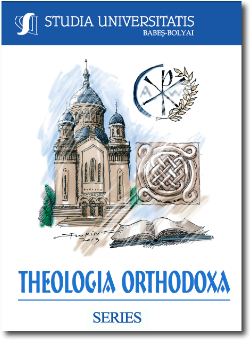UN TEXT MISIONAR PROBLEMATIC: IOAN 20, 23 ȘI ACURATEȚEA TRADUCERII CELOR DOUĂ VERBE PRINCIPALE (ἀφίενται ȘI κεκράτηνται)
A PROBLEMATIC MISSIONARY TEXT: JOHN 20:23 AND THE ISSUE OF THE TRANSLATION OF THE TWO MAIN CLAUSES (ἀφίενται AND κεκράτηνται)
Author(s): Cătălin VargaSubject(s): Biblical studies
Published by: Studia Universitatis Babes-Bolyai
Keywords: perfect tense; indicative present; sacerdotalism; scribal errors; modern translations
Summary/Abstract: One of the most central theological themes of Orthodoxy is sacerdotalism, the mystery of priesthood and its roots growing from this Johannine verse, in which apostles are sent to mission after they were invested with power to forgive the sins. The problem that occurs refers to the translation of the perfect that is found in the main clause in both sentences: ἀφίημι (“to let go, forgive”) and κρατέω (“to retain, to grasp”), which in some manuscripts of the New Testament (Codex Sinaiticus; Codex Alexandrinus; Codex Bezae) and in a few uncials and critical editions of the Greek New Testament (Westcott and Hort; Nestle’s Greek New Testament), appears to be perfect tense.According to Greek New Testament grammars, the perfect tense pictures a past action, the result of which was present to the speaker or writer. So Jesus warned the disciples that they were to treat as forgiven only those that were already forgiven by God. According to this scenario, their entire mission summarizes the acts of authenticating the things that have already been made for them (in their name) and for the people. Our research deals with this issue, underlines the value of indicative present mood of this two verbs, as we encounter them in the byzantine manuscripts of the New Testament and also in Codex Vaticanus. The large context of the story deals with the action of breathing the Holy Spirit over the disciples, transforming them into a new existence and receiving power by this, to forgive or retain everyone’s sins, that is why I see the perfect tense as the result of a scribal error. The difference between the present ἀφίενται and the perfect ἀφέωνται consist of two letters changed, an error that might have occured among the scribs. Establishing the indicative present of the action is an urgent task for the world of orthodox biblical studies, because according to this prerequisite, our whole missionary agenda earns credits.
Journal: Studia Universitatis Babes-Bolyai - Theologia Orthodoxa
- Issue Year: LX/2015
- Issue No: 2
- Page Range: 77-106
- Page Count: 30
- Language: English, Romanian

